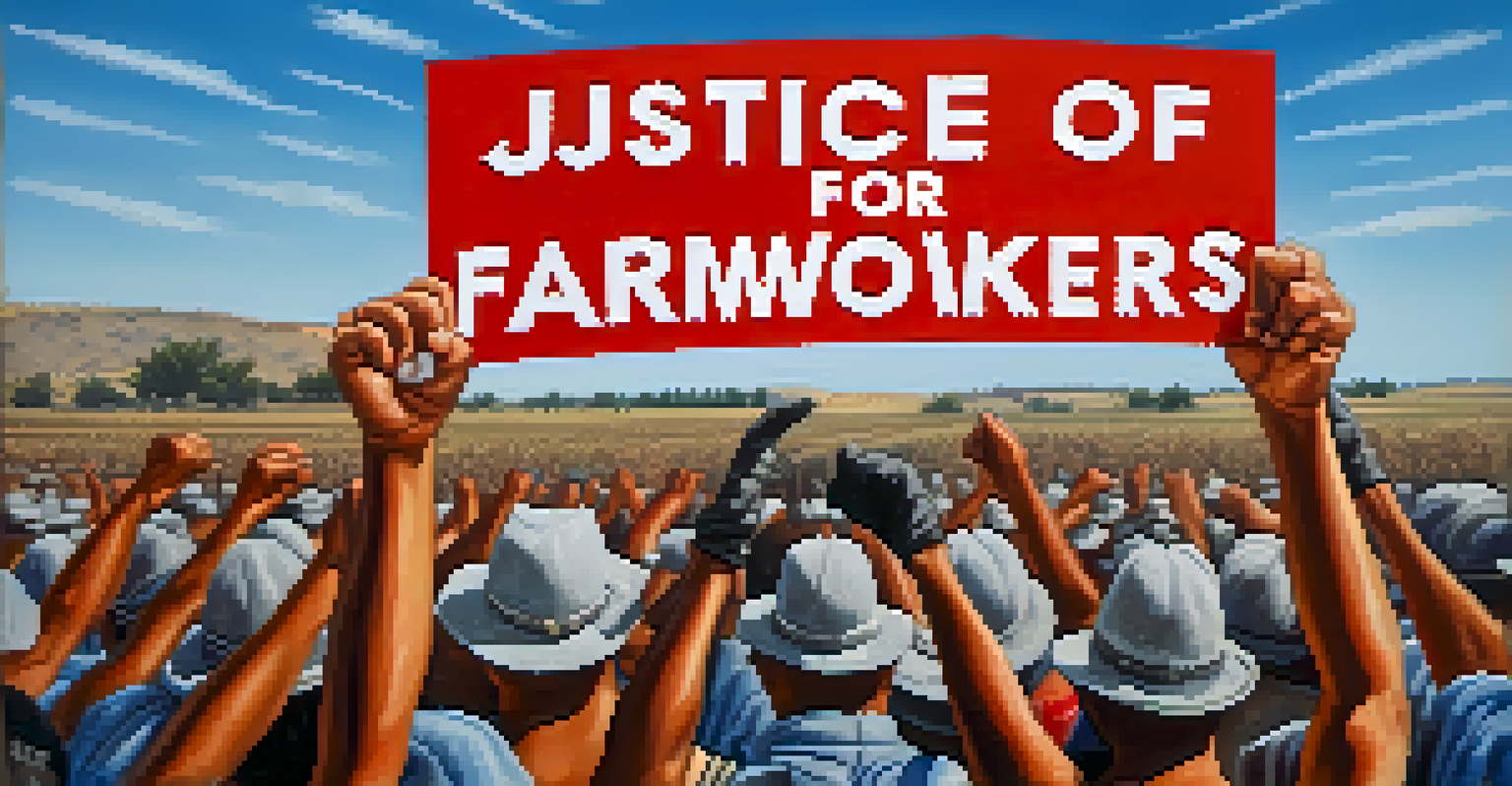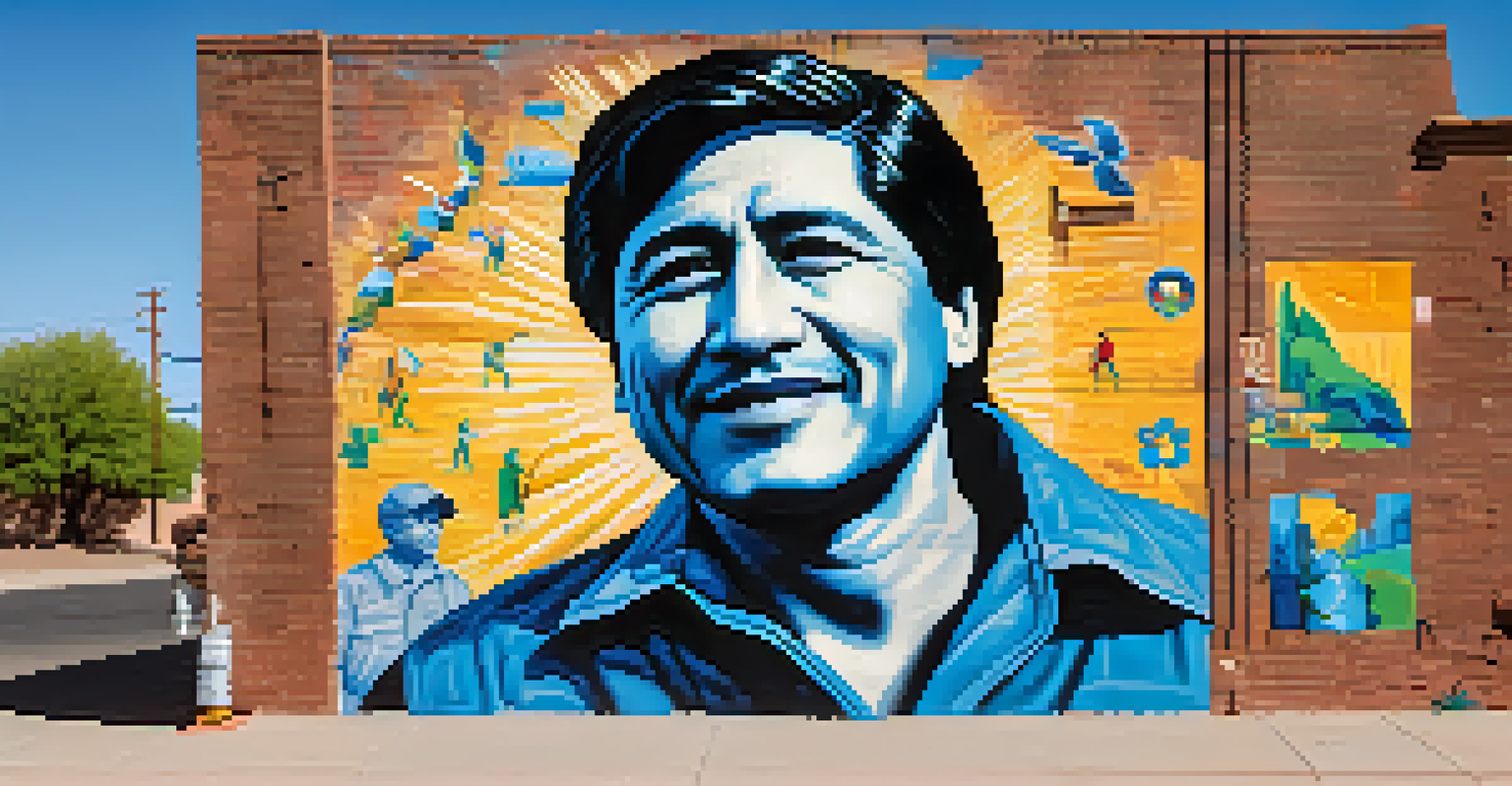Cesar Chavez: A Catalyst for Change in Phoenix Communities

Cesar Chavez: A Voice for the Voiceless
Cesar Chavez emerged as a beacon of hope for marginalized communities, particularly in Phoenix. His dedication to labor rights highlighted the struggles faced by farmworkers, many of whom were in dire conditions. By advocating for better wages and working conditions, he became a voice for those who felt unheard in the hustle and bustle of society. This commitment to social justice resonated deeply within the fabric of Phoenix's diverse communities.
The fight is never about grapes or lettuce. It is always about people.
Chavez believed that everyone deserved respect and dignity at work, which was often lacking in the agricultural sector. His grassroots organizing efforts were not just about labor rights; they were about human rights. Through his initiatives, he inspired many to stand up for their own rights, encouraging a sense of empowerment that had previously been absent in these communities. The ripple effect of his work transformed the way people viewed their own potential for change.
His legacy is an ongoing reminder that collective action can lead to significant shifts in societal norms. In Phoenix, this meant mobilizing communities to unite under a common cause, fostering a sense of solidarity among individuals who shared similar struggles. Chavez's impact continues to be felt, inspiring new generations to advocate for equality and justice in their own lives.
The Birth of the United Farm Workers
In 1962, Chavez co-founded the United Farm Workers (UFW), a pivotal moment in labor history. This organization not only aimed to improve working conditions but also sought to empower farmworkers through collective bargaining. By uniting workers, Chavez demonstrated the strength found in solidarity, proving that change was possible when individuals stood together. The UFW quickly became a powerful force in advocating for labor rights across the nation.

Chavez's approach was innovative; he employed nonviolent tactics, such as strikes and boycotts, to draw attention to the plight of farmworkers. One of the most notable campaigns was the Delano grape strike, which gained national media attention and support. This not only highlighted the struggles of farmworkers but also built a diverse coalition of supporters, including students, activists, and consumers, who joined the cause. It was a beautiful example of how a community can come together for a common goal.
Chavez Empowered Farmworkers
Cesar Chavez's advocacy for labor rights transformed the lives of farmworkers, inspiring collective action and empowerment in marginalized communities.
The success of the UFW also inspired other labor movements, sparking a wave of activism in various sectors. Chavez's work encouraged other marginalized groups to organize and fight for their rights, creating a legacy that has influenced social justice movements to this day. The UFW remains a symbol of hope and perseverance for those striving for fair treatment in the workplace.
Community Organizing: Chavez's Empowerment Model
One of Chavez's key strategies was community organizing, a method that empowered individuals to take action. By creating local chapters of the UFW, he provided a platform for workers to voice their concerns and work towards solutions together. This grassroots approach fostered a sense of ownership among community members, making them active participants in the fight for their rights. It was about more than just labor; it was about building a community with shared goals.
We cannot seek achievement for ourselves and forget about progress and prosperity for our community. Our ambitions must be broad enough to include the aspirations and needs of others, for their sakes and for our own.
Chavez understood that true change comes from within a community, not imposed from the outside. By training leaders within the community, he ensured that the movement was sustainable and deeply rooted in the values of those it represented. This model of empowerment resonated particularly well in Phoenix, where diverse voices came together to create a unified front against injustice. Each member's contribution was valued, reinforcing the idea that collective efforts yield greater results.
The legacy of this approach is evident today, as many community organizations continue to draw inspiration from Chavez's methods. His belief in empowering individuals to rise together remains a cornerstone of effective activism. In Phoenix, the spirit of community organizing lives on, reminding us that when people unite, they can effect change.
Chavez's Influence on Education and Advocacy
Cesar Chavez recognized the importance of education in the fight for social justice. He believed that informed individuals are empowered individuals, and this principle guided many of his initiatives. By promoting educational programs within communities, he aimed to equip future generations with the knowledge and skills needed to advocate for their rights. This focus on education was a crucial component of his vision for lasting change.
In Phoenix, Chavez's influence can be seen in programs that aim to uplift Latino youth through education and civic engagement. These initiatives not only honor his legacy but also address the needs of a community that continues to face challenges. By fostering a culture of advocacy, Chavez’s work encourages young people to become active participants in shaping their futures. This investment in education creates a cycle of empowerment that strengthens the community as a whole.
Legacy of Nonviolence Endures
Chavez's commitment to nonviolent activism continues to inspire community organizers, emphasizing dialogue and cooperation in the fight for social justice.
Moreover, Chavez's emphasis on advocacy extends beyond labor rights; it encompasses a broader social justice framework. His teachings inspire individuals to address issues such as immigration, education equity, and healthcare access, reflecting the interconnectedness of various struggles. By instilling these values, Chavez's legacy continues to inspire a new wave of activists committed to fostering change in their communities.
The Legacy of the March and its Impact
One of the most significant events led by Chavez was the 1966 march from Delano to Sacramento, which served as a powerful symbol of the struggle for farmworkers' rights. This march not only drew attention to the plight of agricultural workers but also helped galvanize public support for their cause. It was a dramatic and visual representation of the challenges faced by farmworkers, creating a narrative that resonated widely across the nation. The march's impact was felt in Phoenix and beyond, inspiring solidarity and activism.
Chavez's ability to mobilize thousands of people, including supporters from various backgrounds, showcased the power of unity in the face of adversity. The march became a pivotal moment in labor history, highlighting the importance of visibility and voice. By bringing the struggles of farmworkers to the forefront, Chavez demonstrated how grassroots movements could effect change on a larger scale. It was a lesson in the power of persistence and community involvement.
Today, the legacy of this march is celebrated in various ways, including education about labor rights and ongoing activism in Phoenix communities. Through annual commemorations and events, Chavez's message of justice continues to inspire new generations. The march is a reminder that the fight for equality and dignity in the workplace is ongoing, encouraging individuals to remain vigilant and active in their communities.
Chavez's Enduring Message of Nonviolence
Cesar Chavez was deeply committed to nonviolence, a principle he championed throughout his activism. He believed that peaceful protests and dialogue were more effective than violence in bringing about social change. This approach not only distinguished him from other leaders of his time but also resonated with the communities he served. Chavez's commitment to nonviolence remains a significant aspect of his legacy, influencing activists worldwide.
In Phoenix, this message of peace and understanding continues to inspire community organizers. Many local groups adopt nonviolent strategies in their advocacy efforts, emphasizing dialogue and collaboration over confrontation. This approach fosters a more inclusive environment, encouraging participation from individuals who may otherwise feel intimidated by more aggressive tactics. Chavez's teachings remind us that progress is often achieved through understanding and cooperation.
Education as a Tool for Change
Chavez recognized education's vital role in social justice, promoting programs that empower future generations to advocate for their rights.
Moreover, Chavez's emphasis on nonviolence serves as a powerful reminder of the dignity inherent in every individual. By advocating for change without resorting to violence, he upheld the value of each person's humanity. This enduring message encourages communities to strive for justice while respecting the rights and dignity of all involved. In Phoenix and beyond, Chavez's legacy of nonviolence continues to resonate, inspiring a commitment to peaceful advocacy.
Continuing Chavez's Work in Phoenix Today
Today, Cesar Chavez's work is far from over; his legacy lives on in numerous organizations dedicated to social justice and labor rights. In Phoenix, various community groups honor his contributions by organizing events, educational programs, and advocacy initiatives. These efforts focus on issues such as workers' rights, immigrant rights, and education equity, echoing the very principles Chavez fought for throughout his life. His influence serves as a catalyst for ongoing activism.
Many local leaders continue to draw inspiration from Chavez's tactics, employing community organizing and nonviolent protest to address contemporary challenges. The spirit of collaboration he fostered remains alive, as individuals come together to advocate for change. This collective effort not only honors Chavez's legacy but also empowers communities to tackle issues that affect their lives today. Through this work, the memory of Chavez becomes a source of strength and motivation.

Moreover, the principles of empowerment and education he championed are now integral to many community programs. By investing in the next generation, these initiatives ensure that Chavez's vision for equality and justice endures. The ongoing fight for social justice in Phoenix serves as a testament to the impact of Chavez's work, reminding us all of the power individuals have when they unite for a common cause.